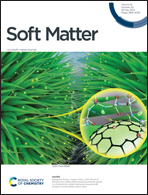Liquid crystal microcapillary-based sensors for affordable analytical applications†
Abstract
Stimuli-responsive properties of liquid crystals (LCs), when combined with their optical properties, offer sensitive and rapid sensing applications. Here, we propose and demonstrate a microcapillary-based method to be applied for the online detection of amphiphilic species, which can be further used for tracking biological and chemical species in aqueous media. Specifically, we used compartments (300–1400 μm) of nematic 4-cyano-4′-pentylbiphenyl (5CB) that were positioned into cylindrical glass microcapillaries that promote homeotropic anchoring. The flat surfaces of the cylindrical LC compartments were in contact with an aqueous media. We characterized the equilibrium and nonequilibrium response of LCs upon a change in their anchoring at the aqueous interfaces. Upon anchoring transition, we observed the formation of a positively charged defect at the proximity of the interface that moved to the center of the LC compartment and reached equilibrium, a four-petal configuration. This transition was observed to take an average of 41 ± 19 min., which we related to the motion of the defect due to the imbalance of the elastic forces. During the transition, we observed metastable states which could be removed via thermal treatment. We showed the capillary sensors to be useful considering their ease of additional quantification. We also show that the sensors are reversible that facilitate temporal and cumulative quantification. The findings reported in this study can further be used to develop sensors for specific purposes that require continuous tracking of the chemical and biological species that is critical for the health and safety of the individuals and society.



 Please wait while we load your content...
Please wait while we load your content...